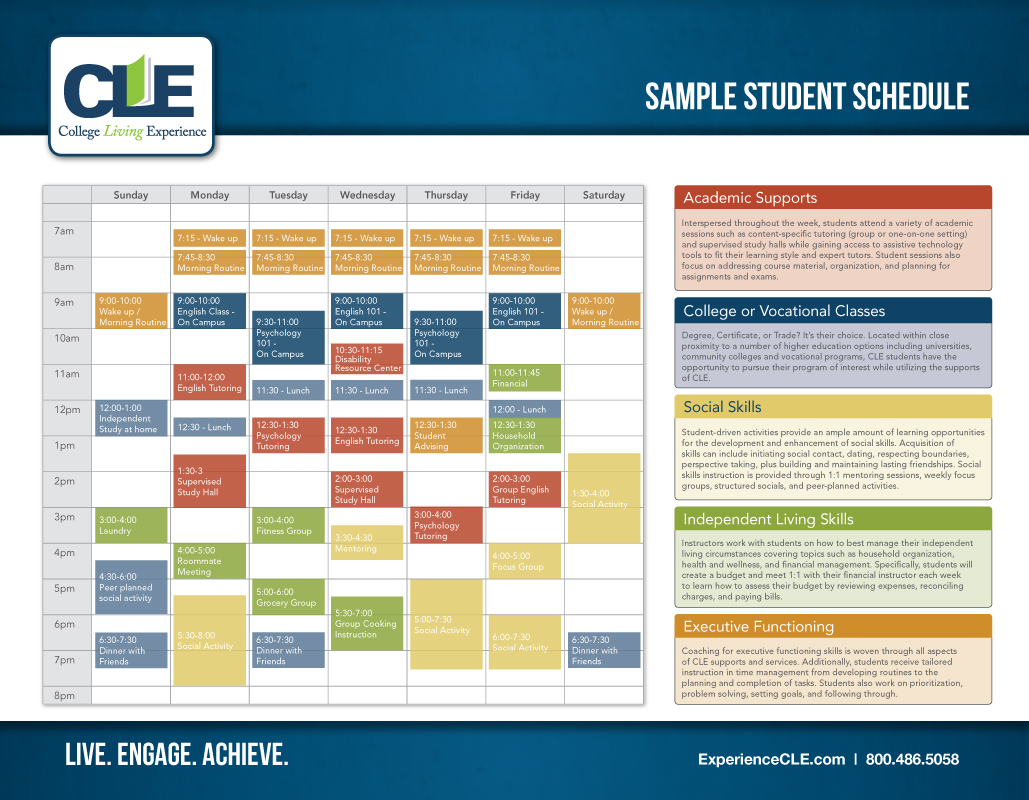CLE provides comprehensive, year round support for students seeking to develop academic, career, social and independent living skills. Individualized instruction across these domains is completed in our center, in students’ apartments, in the community, on campus and in the workplace to maximize the opportunity for learning and generalizing skills.
Students work with a comprehensive support team to guide them through their transition and oversee their progress. CLE instructional team members have a minimum of a bachelor’s degree, and many have graduate degrees in education, psychology or a related field.
The support team for students includes:
- Academic coordinator ensures each student is registered for the appropriate classes based on his or her skill set and instruction level. The liaison also establishes a relationship with the school’s Office of Disability Services, monitors students’ progress, participation and attendance in class, and provides disability awareness among students, faculty and staff.
- Subject-specific tutors work with students in 1:1 or small group settings.
- Independent living skills coordinator/instructors help students manage activities of daily living, such as paying bills, shopping, preparing meals and other skills that promote independence.
- Social coaches who are typically graduate students in psychology, facilitate the guided application of newly learned social skills so students gain independence and confidence.
- Student advisor monitors students’ overall progress and serves as the primary contact with parents.
- Clinical director supervises the mentors, leads student discussion groups and helps the staff develop intervention plans for each student based on the student’s individual needs.
- Resident advisor who lives at or near the students’ apartment complex and helps students navigate daily life, plan and participate in social events and manage routine household matters.
Each applicant is assessed individually to see if he or she would benefit from CLE, as well as determine the most appropriate vocational, technical or academic program. See our Admissions page for instructions on applying to CLE.
es! We encourage potential students, families and professionals to come and visit our centers. Contact us to schedule an appointment.
We also have open house events throughout the year, which can be found on our Events page.
Students live in apartments that are close to the CLE center and the educational program they are enrolled in. Students typically live in a two-bedroom apartment with a CLE roommate. Some students, based on need or preference, may choose to live on their own.
Apartment living, rather than dorm life, provides the chance for CLE students to learn what it takes to be independent in adulthood—with our support. Students can learn to shop for groceries, cook, clean and manage basic maintenance. Under the direction of an independent living skills coordinator, students gain experience and confidence in accepting responsibility for tasks of daily living. Equally important, CLE students receive the social benefits of sharing living space, responsibilities, interaction, and friendship with a roommate.
Yes. Students interested in continuing to live at home can do so if they live near one of the seven CLE locations.
We use individual and group settings to provide all the support our students need to become functional, self-sufficient adults. Check out our sample student schedule to see the level of instruction students receive.
A resident advisor or on-call staff person is available to assist students after their scheduled appointments or social activities. A staff person is on call overnight and on the weekend to help students troubleshoot any challenges or guide them through emergencies.
Most students participate in CLE for two years. It is common for students to remain in the program while they complete their education or receive additional support to transition into a vocational or career setting.
Students typically enroll in CLE after completing secondary education or after pursuing post-secondary education—and identifying their need for greater support. The typical age range is between 18-28.
Students leave CLE prepared to live more independent lives. Our “graduates” explore a variety of opportunities, including living successfully on their own or with a roommate. We’ve also had students establish and maintain appropriate and fulfilling relationships, continue their post-secondary education and begin their careers in a wide variety of industries.
CLE works with neurodivergent students. Some students have autism spectrum disorders, including those previously diagnosed with Asperger’s Syndrome. Others have conditions such as dyslexia and ADD/ADHD or social and emotional maturation issues. We provide ongoing social facilitation to promote acceptance, respect and understanding because we believe these values are fundamental to society.
Our tuition covers academic, career, independent living and social skills instruction for 12 months from a team of professionals whose goal is to help him or her become more self-sufficient, independent and confident.
We recognize financial limitations may make it difficult to participate in CLE. We can help direct families to financial aid or assistance programs that may reduce expenses. Depending on individual student needs, they may be eligible for funding from state or federal agencies, including:
- The Department of Vocational Rehabilitation
- California Department of Developmental Services, Regional Centers, only for California residents
- Supplemental Security Income (SSI)
- Educational Foundation for Independence
Families are encouraged to consult with their tax advisor regarding the use of 529 plans, ABLE accounts and tax deductions toward CLE services.

